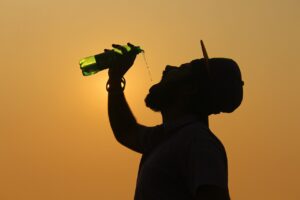Riding a motorcycle is an exhilarating experience that offers freedom, adventure, and a sense of connection with the road. However, it is important to recognize that riding can also lead to dehydration after riding a motorcycle, particularly during long rides or in hot weather conditions. Dehydration occurs when the body loses more fluid than it takes in, and it can have significant effects on both physical and mental well-being. In this article, we will explore the causes, effects, and prevention of dehydration after riding a motorcycle.
Causes of Dehydration:
Excessive Sweating: Riding a motorcycle requires physical exertion, especially during long rides or when navigating challenging terrains. As the body heats up, it tries to cool down by producing sweat. Excessive sweating can lead to a significant loss of fluids and electrolytes, which are essential for proper bodily functions.
Exposure to Sun and Wind: Riding under the scorching sun or in windy conditions can exacerbate the risk of dehydration. The sun’s rays can cause rapid water loss through sweat evaporation, while the wind can increase the rate of moisture evaporation from the skin. These factors, combined with the open nature of motorcycle riding, make riders more susceptible to dehydration.
Inadequate Fluid Intake: Riders may forget to drink enough fluids while focusing on the road or due to limited access to hydration sources. Neglecting fluid intake, especially during long rides, can quickly lead to dehydration.
For a free legal consultation,
call 1-800-414-5196
Effects of Dehydration After Riding a Motorcycle:
Fatigue and Reduced Focus: Dehydration affects energy levels and cognitive function. As the body loses water and electrolytes, it becomes more difficult to concentrate, leading to reduced focus and slower reaction times. Fatigue can set in, making the rider more prone to making mistakes or poor judgments on the road.
Muscle Cramps: Dehydration can disrupt the balance of electrolytes in the body, such as sodium, potassium, and magnesium. Electrolyte imbalances contribute to muscle cramps, which can be painful and affect a rider’s ability to maintain control of the motorcycle.
Impaired Decision-Making: Dehydration can impair judgment and decision-making abilities. As dehydration progresses, cognitive function declines, and riders may become less aware of potential hazards or make poor choices on the road, increasing the risk of accidents.
Heat Exhaustion and Heatstroke: In severe cases of dehydration, heat-related illnesses like heat exhaustion and heatstroke can occur. Symptoms include dizziness, rapid heartbeat, confusion, nausea, and even loss of consciousness. These conditions require immediate medical attention and can be life-threatening if left untreated.
Prevention of Dehydration:
Hydrate Before, During, and After Riding: Start hydrating well before you hit the road by drinking plenty of fluids, preferably water. During rides, carry a sufficient supply of water or electrolyte-rich drinks and sip regularly, even if you don’t feel thirsty. After the ride, replenish fluids lost during sweating by continuing to hydrate.
Dress Appropriately: Choose lightweight and breathable riding gear that allows airflow to help regulate body temperature and minimize excessive sweating. Opt for moisture-wicking materials that keep sweat away from the skin, reducing the risk of dehydration.
Schedule Regular Breaks: Plan regular stops during long rides to rest, rehydrate, and cool down. Use these breaks to drink water, replenish electrolytes through sports drinks or electrolyte tablets, and allow your body to recover from the physical demands of riding.
Monitor Weather Conditions: Stay informed about weather conditions before setting out on a ride. Avoid riding during extreme heatwaves or at times of the day when temperatures are highest. If you must ride in hot weather, take extra precautions to stay hydrated and cool.
Be Mindful of Alcohol and Caffeine: Alcohol and caffeinated beverages have diuretic effects, increasing urine production and fluid loss. Avoid consuming excessive amounts of alcohol or caffeine before or during rides, as they can contribute to dehydration.
Recognize Early Signs of Dehydration: Learn to recognize the early signs of dehydration, such as thirst, dry mouth, dark-colored urine, dizziness, or fatigue. If you experience these symptoms, take immediate steps to rehydrate and rest before continuing your ride.
In conclusion, dehydration is a risk that motorcycle riders should be aware of, especially during long rides or in hot weather. It can lead to fatigue, impaired focus, muscle cramps, and even heat-related illnesses. By staying hydrated, dressing appropriately, taking regular breaks, and being mindful of weather conditions and fluid intake, riders can prevent dehydration and enjoy a safer and more comfortable riding experience. Remember, your body’s hydration is as important as the thrill of the ride.
Call or text 1-800-414-5196 or complete a Free Case Evaluation form

